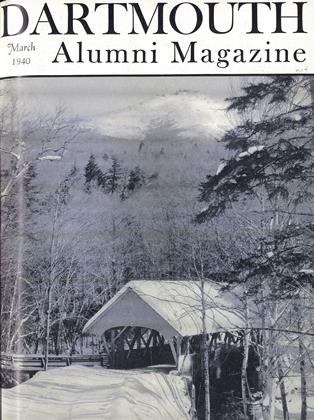RANDOM SHOTS in an attempt to locate pleasant feminine companionship do not always pan out. "Service Unlimited" may have its troubles in Hanover. The Associated Press reports the following interesting situation:
Into the postoffice of Sweet Briar College came a post card, addressed to Box 408, from a southern school.
"Dear Box 408," it read, "I was just wondering what the holder of my box number at Sweet Briar looks like.
"As for me, I am tall, dark, and I drive a Ford V-8. I am a freshman. What do you look like? Where are you from and what class are you in?"
Out from Sweet Briar went the reply to Box 408 at the southern institution. It read in part:
"I am tall, too, and not as thin as I once was. My hair is white and I drive a Buick. I was a freshman in 1896."
Postoffice Box 408 at Sweet Briar belongs to the president of the college, Dr. Meta Glass, sister of Virginia's Senator Carter Glass.
In closing her letter she said: "Maybe you will get to Sweet Briar in your Ford V-8 some day. If so, come in to see me."
THE SPECIAL COMMITTEE of the Alumni Council, headed by Mr. Harold P. Hinman '10, asked to study the question of strengthening class organization, has recently reported to officers of all classes. The report is concise and encouraging. It states that 55 classes now operate on the group subscription plan (100% circulation of the ALUMNI MAGAZINE), resulting in more than 13,000 Dartmouth men being kept regularly in touch with each other, with class activities, and with the College. "The group subscription plan's effectiveness," the report continues, "in increasing the ranks of the College's already enormous diplomatic force in the field has been demonstrated." In this achievement the class treasurers have shown themselves to be an exceedingly capable and vital group in Dartmouth affairs.
Not in all cases have class treasurers been able to avoid a deficit in the plan of contracting for subscriptions to the MAGAZINE in September and then relying upon payment of modest dues by men in the class to pay the freight. But in the majority of classes the collection of dues, sometimes supplemented by added contributions of interested men, have been successful. Their treasuries are in the black.
This leads Mr. Hinman's committee to feel that great progress has been made toward the objective of a permanent solution of the question of placing this publication in the hands of every Dartmouth man. Whether the formula is the right one or not is still subject to trial and testing during an experimental period of years.
Dartmouth and Princeton are the only colleges in the country, so far as we know, that are in regular touch with a majority of the alumni body. This situation, very gratifying to the editors, is a sign of
progress in the direction in which Mr. Williams feels the College must go, as stated in his article in this issue of the MAGAZINE, and as referred to in an item above. We are confident that a better job can be done in these pages, as time goes on, truly to reflect the objectives and achievements of the College; and more than that, to help give men satisfaction in their Dartmouth association during the fifty years of post-college life, that Mr. Williams describes, as well as the undergraduate four years.
A VARIATION in old prints, with rural emphasis on a bovine foreground, is carried at the head of these notes this month. This is a woodcut view showing the old row, Reed Hall, and a view of the south end of the campus together with the old hotel. It is signed "Wade Major sc," and is taken from Gleason's Pictorial for 1851.
 View Full Issue
View Full Issue
More From This Issue
-
 Article
ArticleEducation At Its Best
March 1940 By ARTHUR DEWING '25 -
 Sports
SportsBig Green Teams
March 1940 By Whitey Fuller '37 -
 Article
ArticleAn Obligation to Alumni
March 1940 By BEN AMES WILLIAMS '10 -
 Article
ArticleHanover Browsing
March 1940 By HERBERT F. WEST '22 -
 Class Notes
Class Notes1930*
March 1940 By ALBERT I. DICKERSON -
 Article
ArticleThe College in the Sixties
March 1940 By DR. WILLIAM LELAND HOLT








